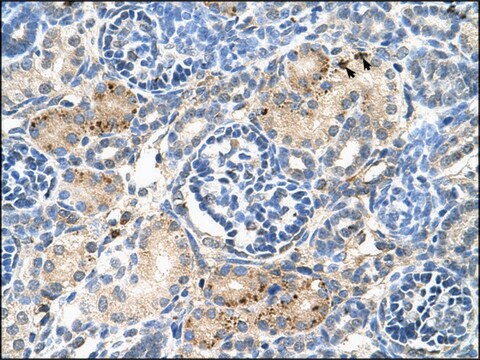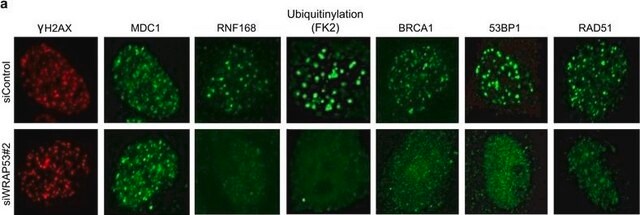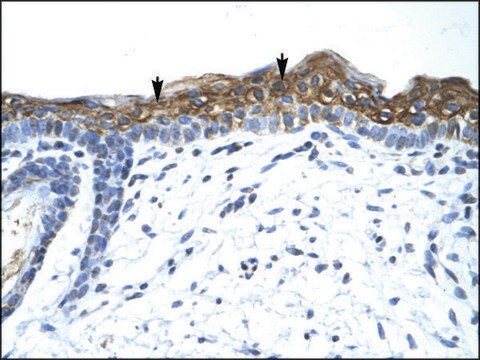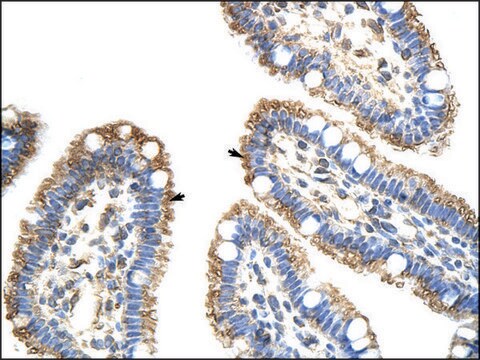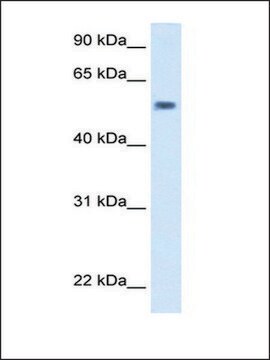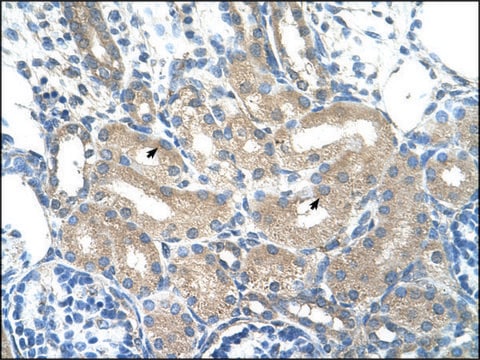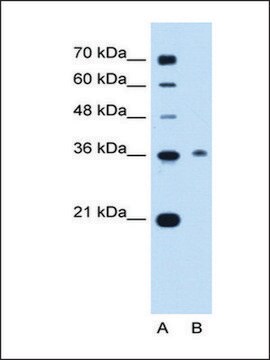おすすめの製品
由来生物
rabbit
品質水準
結合体
unconjugated
抗体製品の状態
IgG fraction of antiserum
抗体製品タイプ
primary antibodies
クローン
polyclonal
形状
buffered aqueous solution
分子量
16 kDa
化学種の反応性
mouse, rat, dog, human, pig
濃度
0.5 mg - 1 mg/mL
テクニック
immunohistochemistry: suitable
western blot: suitable
NCBIアクセッション番号
UniProtアクセッション番号
輸送温度
wet ice
保管温度
−20°C
ターゲットの翻訳後修飾
unmodified
遺伝子情報
human ... EDG8(53637)
免疫原
Synthetic peptide directed towards the N terminal region of human EDG8
生物化学的/生理学的作用
EDG8 is a receptor for the lysosphingolipid sphingosine 1-phosphate (S1P). S1P is a bioactive lysophospholipid that elicits diverse physiological effect on most types of cells and tissues. It Is coupled to both the G(i/0)alpha and G(12) subclass of heteromeric G-proteins (By similarity). It may play a regulatory role in the transformation of radial glial cells into astrocytes and may affect proliferative activity of these cells.The modification of proteins with ubiquitin is an important cellular mechanism for targeting abnormal or short-lived proteins for degradation. Ubiquitination involves at least three classes of enzymes: ubiquitin-activating enzymes, or E1s, ubiquitin-conjugating enzymes, or E2s, and ubiquitin-protein ligases, or E3s. This gene encodes a member of the E2 ubiquitin-conjugating enzyme family. This enzyme functions in the ubiquitination of the tumor-suppressor protein p53, which is induced by an E3 ubiquitin-protein ligase. Two alternatively spliced transcript variants have been found for this gene and they encode distinct isoforms.
シーケンス
Synthetic peptide located within the following region: MESGLLRPAPVSEVIVLHYNYTGKLRGARYQPGAGLRADAVVCLAVCAFI
物理的形状
Purified antibody supplied in 1x PBS buffer with 0.09% (w/v) sodium azide and 2% sucrose.
免責事項
Unless otherwise stated in our catalog or other company documentation accompanying the product(s), our products are intended for research use only and are not to be used for any other purpose, which includes but is not limited to, unauthorized commercial uses, in vitro diagnostic uses, ex vivo or in vivo therapeutic uses or any type of consumption or application to humans or animals.
Not finding the right product?
Try our 製品選択ツール.
保管分類コード
10 - Combustible liquids
WGK
WGK 3
引火点(°F)
Not applicable
引火点(℃)
Not applicable
適用法令
試験研究用途を考慮した関連法令を主に挙げております。化学物質以外については、一部の情報のみ提供しています。 製品を安全かつ合法的に使用することは、使用者の義務です。最新情報により修正される場合があります。WEBの反映には時間を要することがあるため、適宜SDSをご参照ください。
Jan Code
AV42661-100UG:
AV42661-100UL:
試験成績書(COA)
製品のロット番号・バッチ番号を入力して、試験成績書(COA) を検索できます。ロット番号・バッチ番号は、製品ラベルに「Lot」または「Batch」に続いて記載されています。
Babita Rahar et al.
High altitude medicine & biology, 20(1), 78-88 (2019-03-21)
High altitude exposure alters biochemical, metabolic, and physiological features of heart and skeletal muscles, and hence has pathological consequences in these tissues. Central to these hypoxia-associated biochemical/metabolic shuffling are energy deficit accumulation of free radicals and ensuing oxidative damage in
ライフサイエンス、有機合成、材料科学、クロマトグラフィー、分析など、あらゆる分野の研究に経験のあるメンバーがおります。.
製品に関するお問い合わせはこちら(テクニカルサービス)